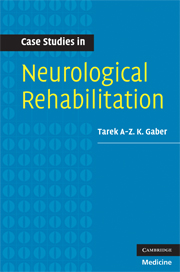Book contents
- Frontmatter
- Contents
- Preface
- Part I Clinical rehabilitation
- Part II Case studies
- 3 Medical issues in brain injury rehabilitation
- 4 Progressive neurological disorders
- 5 Medical complications of immobility
- 6 Orthotics in neurological rehabilitation
- 7 Ethical and medicolegal controversies
- 8 Chronic pain
- 9 Medically unexplained disorders
- 10 Spasticity management
- 11 Ventilatory support in rehabilitation
- 12 Sphincteric dysfunction
- 13 Communication disabilities
- 14 Sensory disability
- 15 Prescriptions for independence
- Part III Exercises in neurological rehabilitation
- Index
3 - Medical issues in brain injury rehabilitation
from Part II - Case studies
Published online by Cambridge University Press: 13 August 2009
- Frontmatter
- Contents
- Preface
- Part I Clinical rehabilitation
- Part II Case studies
- 3 Medical issues in brain injury rehabilitation
- 4 Progressive neurological disorders
- 5 Medical complications of immobility
- 6 Orthotics in neurological rehabilitation
- 7 Ethical and medicolegal controversies
- 8 Chronic pain
- 9 Medically unexplained disorders
- 10 Spasticity management
- 11 Ventilatory support in rehabilitation
- 12 Sphincteric dysfunction
- 13 Communication disabilities
- 14 Sensory disability
- 15 Prescriptions for independence
- Part III Exercises in neurological rehabilitation
- Index
Summary
Because of its high incidence in the young population, traumatic brain injury has become one of the major challenges from a public health perspective. The overwhelming majority of the more than one million patients attending accident and emergency departments in Britain each year will have mild head injury and will suffer mild and transient symptoms with no long-term complications. However, a minority of those patients with mild head injury will suffer significant chronic cognitive impairments that will impact on their social and/or vocational functions. Glasgow Coma Scale assessment plus the period of post-traumatic amnesia have traditionally been used to determine the severity of the head injury; amnesia of less than an hour indicating a mild head injury, for 1–24 hours indicating moderate injury and for more than 24 hours indicating severe head injury.
Clinically, neither severity of the head injury nor brain scan findings are able to indicate unequivocally the long-term prognosis, with many patients with a mild head injury and normal scans going on to develop significant cognitive or behavioural disabilities that will impact on their social and/or vocational functions while full recovery following a moderately severe head injury is occasionally seen.
Different service models have been suggested to try to screen patients with mild brain injury for cognitive impairments, with accident and emergency follow-up clinics for mild brain injury being commonly used. Accident and emergency departments provide patients with written information about symptoms of post-concussion syndrome and advise them to contact their GP if the symptoms persist.
- Type
- Chapter
- Information
- Case Studies in Neurological Rehabilitation , pp. 11 - 43Publisher: Cambridge University PressPrint publication year: 2008



